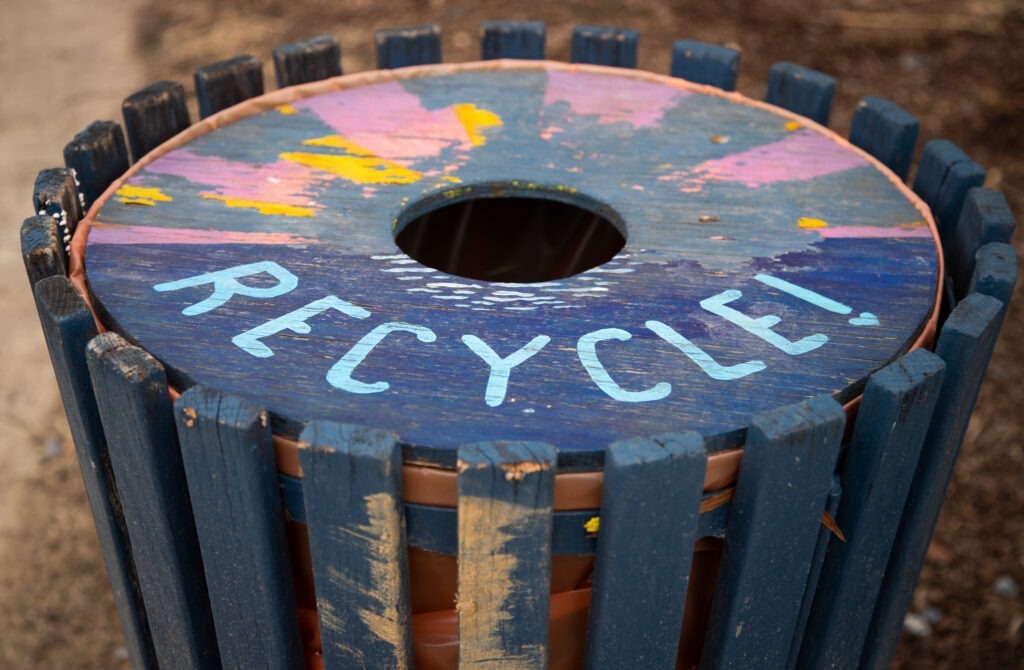As campus aims to be more sustainable, students struggle with proper recycling procedures
4 min read
With the launch of the Choose to Reuse campaign, UMW is aiming to be more environmentally sustainable. | Emily Warren, The Blue & Gray Press
by TAMARA OMER
Staff Writer
UMW is making efforts to become more environmentally sustainable through the Choose to Reuse campaign and is looking to educate students on what can and cannot be recycled. But despite UMW’s efforts, students often do not follow recycling guidelines, and some are confused about what and where they are able to recycle.
UMW Dining has made an effort to educate students on how to reduce food waste.
“We do give out tips about reducing food waste, and we’ve encouraged students to bring reusable bags to the Top of the UC so they can put their carry-out containers in them instead of plastic bags,” said UMW Dining’s general manager David Schneider. “This spring we partnered with General Mills again and distributed about 250 more reusable bags.”
In addition to giving tips on reducing waste and their use of reusable bags, UMW Dining has also cut down plastic waste by using containers that are recyclable or compostable, and are continuing to find alternatives to the plastic utensils at the Top of the UC.
In a couple of weeks, UMW dining is planning to launch their Choose to Reuse campaign and are looking into ways to increase other environmental efforts. The campaign will give students the opportunity to cut down on disposable waste.
“We would have reusable containers, food and possibly beverage, that would be purchased using flex dollars,” said Schneider.
Guests would exchange their container for a new one when returning back for their next meal.
The campaign will largely be the same as the Choose to Reuse campaign that was held in prior semesters, though there may be some change to come.
“With COVID, the program may alter slightly to accommodate the new norms, but in theory would be the same,” Schneider said. “When we see some sort of normalcy, we look forward to re-engaging with the President’s Council on Sustainability and other student groups focused on common sustainability goals.”
First-year student Asa Iem started noticing the mistakes that people make on campus while disposing of waste and recyclables when she started working as a student facilities assistant.
“Most of the time it’s people throwing away food [in the recycling bin] that’s completely uneaten or unfinished,” Iem said.
Schneider has also been informed on the issue of students’ recycling habits.
“[I] have heard it mentioned in various sustainability meetings that it is challenging to get students to follow recycling procedures in the residence halls,” he said. “It is more relevant now as we have moved to all takeout containers to ensure the safety of our guests.”
According to Schneider, in order to recycle plastic and paper materials, they must have less than 10 percent of food waste on them.
“Within those guidelines, we recycle all cardboard boxes, paper and cooking oil. The majority of our disposables used are recyclable, and/or compostable. This applies to Top of the UC, the Market, Bodacious Burger and Catering,” Schneider said.
Iem believes that incorrect recycling may be happening because people do not know what they can and can’t recycle. Currently, there are signs near trash bins around campus that aim to guide students on what items are disposable waste. Some of the items include styrofoam, paper towels and food.
Recycling guides specify that students should bag their recyclables before they go to dispose of them, which, according to Iem, isn’t a procedure that students always follow.
“I think there are helpful signs around the bins to help students understand what they can and cannot recycle, but I have noticed that this doesn’t really stop people from throwing their trash in any way,” said senior geology major Trevor Gunn.
Knowing what to recycle doesn’t come as a problem to Gunn, though he sometimes finds it confusing to know where he is supposed to dispose of his recyclables.
“Sometimes the bins can be confusing just because some of them just seem like ordinary trash cans with a different-colored bag,” he said.
Even though there are efforts being made, many believe there is much more to be done in order to make UMW a more sustainable campus.
“If it was just a small amount of trash that ends up in the recycling then it wouldn’t be a huge deal, but the thing is that it happens a lot,” said Iem. “During [winter] break… there was a lot of recycling some days and other times I was really surprised at what ended up in there.”
Food items such as uneaten Caesar’s pizzas and jugs of apple sauce are some of the things that Iem would find at the recycling drop sites near residence halls.
“It’s mainly just completely untouched and uneaten food, it makes me really upset to see,” she said. “I know that food waste is one of the biggest issues about the environment, so to see a relatively climate-conscious campus do this to the recycling bins it makes me pretty upset.”











